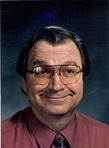David Schwinghammer's Blog - Posts Tagged "parallel-universes"
PARALLEL WORLDS
Michio Kaku's discussion of PARALLEL WORLDS results from physicists' attempts to reconcile Einstein's Theory of Relativity with that of quantum mechanics to form a "theory of everything." M-Theory, the newest form of string theory, allows for the possibility of a parallel universe no more than a millimeter from ours. Kaku believes the newest super collider, which should be ready in 2007, may reveal evidence pointing to this alternate universe.
Another theory, Alan Guth's inflationary universe theory, argues that the universe expanded much faster than the speed of light (possible because this was empty space that was expanding) and that the antigravity force which caused this original Big Bang still exists, allowing for more explosions, more inflation, and multi-universes.
Also, if we apply the quantum theory to the universe, we are forced to admit that the universe, like an electron, may exist simultaneously in many states.
Kaku asks the question, "What might these alternate universes look like?" Kaku theorizes that each time a new universe sprouts off from the original the physical laws change, creating entirely new realities. All of this gets even stranger when Kaku projects that all possible quantum worlds might exist simultaneously.
The author does not shy away from controversial issues, such as the Designer Universe. At one point he compares the likelihood of our world occurring by accident to a "Boeing 747 aircraft being completely assembled as a result of a tornado striking a junkyard."
PARALLEL WORLDS really gets interesting when Kaku discusses Nikolai Kardashev's classification of civilizations according to energy output. Type I would have harnessed planetary forms of energy. Type II would be able to consume the energy output of its star and might even be able to ignite neutron stars. Type III has colonized large portions of its home galaxy and is able to use the energy from ten billion stars. Earth is a rather primitive civilization in contrast. Kaku states that if we reach Type I civilization it may launch a time of "unparalleled peace and prosperity." But that's a big if, considering the greenhouse effect, pollutin, nuclear war, fundamentalism and disease.
Kaku ends his book with a theological discussion of sorts. "If all possible universes exist, what's the point?" he asks. In a quantum universe, parallel selves would exist in parallel universes, with "different life histories and different destinies." Kaku believes that if string theory is eventually confirmed, providing a theory of everything, one must ask where the equation came from.
The author ends on a high note, seeing this as the most momentous time in human history, a time of transition to a type I civilization, a true paradise on Earth, if we can overcome our self-destructive natures.
Another theory, Alan Guth's inflationary universe theory, argues that the universe expanded much faster than the speed of light (possible because this was empty space that was expanding) and that the antigravity force which caused this original Big Bang still exists, allowing for more explosions, more inflation, and multi-universes.
Also, if we apply the quantum theory to the universe, we are forced to admit that the universe, like an electron, may exist simultaneously in many states.
Kaku asks the question, "What might these alternate universes look like?" Kaku theorizes that each time a new universe sprouts off from the original the physical laws change, creating entirely new realities. All of this gets even stranger when Kaku projects that all possible quantum worlds might exist simultaneously.
The author does not shy away from controversial issues, such as the Designer Universe. At one point he compares the likelihood of our world occurring by accident to a "Boeing 747 aircraft being completely assembled as a result of a tornado striking a junkyard."
PARALLEL WORLDS really gets interesting when Kaku discusses Nikolai Kardashev's classification of civilizations according to energy output. Type I would have harnessed planetary forms of energy. Type II would be able to consume the energy output of its star and might even be able to ignite neutron stars. Type III has colonized large portions of its home galaxy and is able to use the energy from ten billion stars. Earth is a rather primitive civilization in contrast. Kaku states that if we reach Type I civilization it may launch a time of "unparalleled peace and prosperity." But that's a big if, considering the greenhouse effect, pollutin, nuclear war, fundamentalism and disease.
Kaku ends his book with a theological discussion of sorts. "If all possible universes exist, what's the point?" he asks. In a quantum universe, parallel selves would exist in parallel universes, with "different life histories and different destinies." Kaku believes that if string theory is eventually confirmed, providing a theory of everything, one must ask where the equation came from.
The author ends on a high note, seeing this as the most momentous time in human history, a time of transition to a type I civilization, a true paradise on Earth, if we can overcome our self-destructive natures.
Published on March 25, 2014 10:33
•
Tags:
alan-guth, m-theory, michio-kaku, nikolai-kardashev, parallel-universes, quantum-mechanics, science, string-theory



